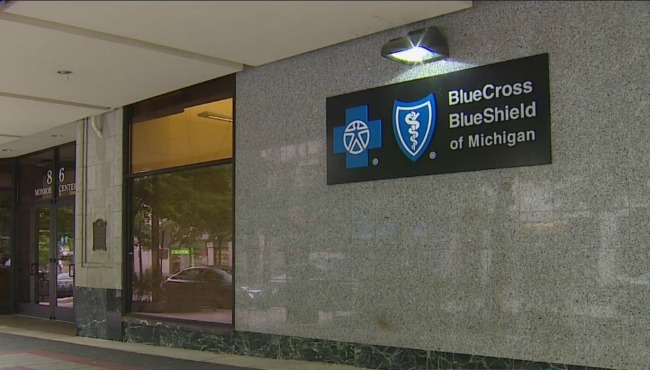GRAND RAPIDS, Mich. (WOOD) — A deal involving Michigan’s largest health insurance company and dozens of hospitals cost patients and businesses an extra $118 million, an expert estimates.
But those insurance customers will likely get little to no compensation from the consequential settlements, Target 8 investigators have uncovered.
A REASON FOR RISING HEALTHCARE COSTS?
Blue Cross Blue Shield of Michigan is being sued by several groups for old contracts with hospitals.
Under a typical contract, insurance companies negotiate the lowest reimbursement rate to hospitals for a patient’s bill.
However, Blue Cross Blue Shield of Michigan offered to pay hospitals more money towards bills if the hospital agreed to charge all other insurance companies as much or more than Blue Cross Blue Shield of Michigan.
“This type of most favored pricing guarantee is much more valuable than the type of reduction we can realistically expect to achieve through negotiations,” Blue Cross Blue Shield of Michigan stated in one transcript obtained by Target 8.
“So the hospitals get paid more money, Blue Cross gets a better deal, and everyone else has to pay even more money. And so Blue Cross makes more money and healthcare expenses go up,” explained Perrin Rynders, an attorney at Varnum Law in Grand Rapids.
Attorneys for those suing Blue Cross Blue Shield of Michigan say there were about 70 Michigan hospitals with these “Most Favored Nation” agreements.
INSIDE THE AGREEMENT
Dozens of hospitals had the standard MFN agreement that allegedly ensured other insurance companies paid the same higher reimbursement rates as Blue Cross Blue Shield of Michigan.
Court records show that in West Michigan, Allegan General Hospital, Lakeview Hospital in Paw Paw, Three Rivers Hospital and two hospitals in Montcalm County had these agreements.
“After purchasing Lakeview Hospital in Paw Paw in 2008, Bronson learned there was a Blue Cross Michigan contract with an MFN provision which Bronson subsequently removed,” said Carolyn Wyllie of Bronson Healthcare System.
When Target 8 contacted Allegan General Hospital about the MFN provision, spokesperson Penny Brown said she couldn’t comment on the MFN provision in past contracts because of pending lawsuits. She did say the hospital values its relationship with all health insurers.
“These partnerships promote the delivery of cost-effective, high quality care and help ensure the continued availability of needed medical services to the greater Allegan community to the benefit of both the insured and uninsured populations served by Allegan General Hospital,” she added.
Blue Cross Blue Shield of Michigan also allegedly took its higher rate deal a step further. The insurance giant is accused of creating contracts with MFN-Plus provisions, which insisted competitors pay more than Blue Cross Blue Shield of Michigan.
In West Michigan, Blue Cross Blue Shield of Michigan contract with Metro Heath allegedly required competitors to pay increasingly more over time. Eventually rival HMO plans would have to pay 5 percent more than Blue Cross Blue Shield of Michigan, and PPO plans would have to pay 10 percent more than Blue Cross Blue Shield of Michigan.
At Borgess Health in Kalamazoo, other insurance companies were allegedly required to pay 10 percent more than Blue Cross Blue Shield of Michigan.
In exchange for these agreements, Blue Cross Blue Shield of Michigan allegedly increased its reimbursement rate to hospitals by a half-percent.
Target 8 reached out to both hospitals; only Metro Health responded.
“The contract in question no longer exists. We have been advised that litigation on this issue may continue, and, for that reason, can’t provide additional information. Instead, we want to focus on looking forward and on other positive transactions,” a spokesperson said.
CONTRACT IMPACT
Since most court records regarding the alleged contracts are sealed, it is not clear how much patients overpaid because of these agreements.
However, the judge and lawyers involved in each lawsuit can see those records. One of those lawyers is Dan Small.
He tells Target 8 that after years of discovery and investigation, experts could only find higher costs at 13 of the 70 hospitals with Blue Cross Blue Shield of Michigan’s MFN agreement. Small is not able to say which 13 hospital saw price increases.
According to an sealed expert report cited by the appeals court, patients and businesses paid $118 million more due to the MFN agreements at these 13 hospitals.
According to complaints listed in court records, American Axle in Three Rivers saw increased heath care costs due to the MFN provision. Grand Rapids-based Priority Health may have also been impacted.
Blue Cross Blue Shield of Michigan denies this. Lawyers for the insurance company argue in court records that the contracts had little to no impact on healthcare costs.
SECRETIVE SETTLEMENT?
Since the alleged contract deals were uncovered, the U.S. Department of Justice, Michigan’s Attorney General, labor unions, patients and a rival insurance company have filed lawsuits against Blue Cross Blue Shield of Michigan.
In 2013, Michigan lawmakers changed the way Blue Cross operates and banned the insurance giant from using MFN agreements. In turn, the U.S. Department of Justice and Michigan Attorney General dropped their lawsuits against Blue Cross Blue Shield of Michigan.
A $13.7 billion federal class-action lawsuit is pending. In a first attempt at settling, Blue Cross Blue Shield of Michigan’s lawyers offered $30 million. Of that amount, more than half would’ve gone to lawyer expenses, leaving the estimated 3 million to 7 million customers involved in the lawsuit to split $14,661,560.
Several businesses and people objected to the settlement, saying it’s impossible to tell if the deal is fair when many court records are sealed. In June, the Court of Appeals agreed with them.
“Suffice it to say that ‘financial and negotiating information’ about a practice since outlawed by the Michigan Legislature is not entitled to protection as a legitimate trade secret,” the court stated in its ruling.
“The amount of the settlement seems to be extremely low,” Rynders said “When you try to negotiate a settlement that is going to affect millions of people, you can’t keep the foundation, or the reasons for that settlement secret from the millions of people that are going to be affected by it,” he added.
Small defended the settlement, saying lawsuits like this carry a lot of risk.
“Had we litigated this case to the end there may have been no recovery to the class,” he added.
The federal appeals court also questioned the attorney fees that took more than half the settlement. Small said the lawyers only billed about two-thirds of time spent on the case and litigation was expensive. He said the sealed expert report cost nearly $2.5 million and it cost about $1.5 million to send notices to possible members of the class-action suit.
As for why so many records are sealed, Small and attorneys for Blue Cross Blue Shield of Michigan said the class-action lawsuit was modeled after the first federal lawsuit, which included a protective order limiting access to confidential information.
WHAT’S NEXT
A federal judge in Detroit will unseal records over the next couple months.
Lawyers for both sides plan to resubmit basically the same settlement to the court by Oct. 11.
The judge will hold a hearing to determine if the agreement appears fair on Dec. 1. If she gives the settlement a preliminary approval then notices will once again go out to millions of class members who will have to respond to get their share of the settlement.
While it’s up to the judge, Small says he expects the estimated 45,000 people who submitted a claim during the first settlement negotiation will not be required to submit another claim.
Once the claims deadline has passed, the judge will hold another fairness hearing to decide whether she will give final approval to the settlement.
Share this:
Source: woodtv.com




